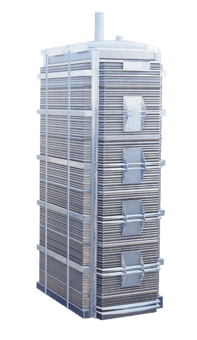
The modular design of fuel cell technology
Fuel cells react fuel and air to create electricity. FuelCell Energy’s technology is designed as thin, rectangular cells that can be combined in a series and repeated as “stacks” as power needs grow. In each of FuelCell Energy’s carbonate “stacks” there are 400 individual fuel cells stacked vertically. Four of these stacks, totaling 1,600 fuel cells, are included inside a power block module that can produce 1.25 megawatts of power.
Repeatable 1.25 MW power blocks
Fuel cell systems are comprised of power block modules, along with mechanical and electrical components to support the system. The Mechanical Balance of Plant (MBOP) supports fuel and air preparation. The Electrical Balance of Plant (EBOP) transfers usable, reliable electricity from the power block module to the grid or whatever system is consuming the energy.
One of FuelCell Energy’s most common systems, the 3000 Carbonate Fuel Cell System, has two 1.25 MW power block modules totaling 2.5 MWs of output. The high output of FuelCell Energy’s 1.25 MW building block reduces the total amount of modules, and support systems, needed in large-scale applications. The repeatable systems are installed in rows, allowing sites to incrementally add output and redundancy over time, without having to make the capital investment in, for example, a 10 MW or 25 MW system all at once.

3000 Fuel Cell System comprised of two modules for a total of 2.5 MWs of output.
The modular approach also simplifies maintenance scheduling, as individual modules can be serviced or upgraded without disrupting the entire system. By adding more fuel cell modules, facilities can enhance redundancy, ensuring that other modules continue operating if one goes offline—maximizing overall site uptime and reliability.
Fuel cell systems can integrate with other generation assets like battery energy storage systems, turbines, diesel gensets, and solar and wind. This ease of integration allows fuel cells to add capacity to existing systems and provide complimentary baseload power at sites where load following is critical.
Power density advantages of fuel cell systems
The 3000 Carbonate Fuel Cell system’s rectangular footprint is approximately 55’ wide and 60’ long—comfortably fitting within the footprint of two tennis courts. In larger-scale installations, the systems can be configured to be even more compact, potentially generating up to 33 MWs per acre of land. The compact design is ideal for sites needing to generate power in a limited space.

Pictured above: 50 MW FuelCell Energy system installed in two rows along the side of a building.
Emissions profile enables expedited or exempt air permitting
The combustion-free operation of FuelCell Energy’s technology can reduce pollutants and improve local air quality, making it ideal for deployment on-site and within urban areas. Our carbonate fuel cells are certified to operate on natural gas and digester gas under the California Air Resources Board’s (CARB) standards, expediting the permitting process in certain clean air districts. Outside the state of California, the CARB 2007 certification independently validates the clean air profile of our systems.
Inside the fuel cell modules themselves, there are no moving parts or traditional combustion engines, allowing for quieter operation suitable for scaling up in noise-sensitive environments. Even when accounting for the system’s support equipment, FuelCell Energy’s 3000 Carbonate Fuel Cell system has a similar decibel level to normal conversation (62 dBA @ 30 ft). The quiet operation of fuel cells is occasionally overlooked but becomes increasingly important as sites consider multi-megawatt installations.
Proven experience in multi-megawatt installations
As the only fuel cell manufacturer with demonstrated performance of plants over 10 MW, 20 MW, and 58 MW with more than five years of run time, FuelCell Energy is a proven partner for multi-megawatt installations. FuelCell Energy is known for developing multiple large-scale fuel cell systems in Korea, including a 58 MW installation at the Hwaseong Balan Industrial Complex that is capable of powering approximately 135,000 homes and providing heat to 20,000 homes.
Contact us today to learn more about our carbonate fuel cell systems.

